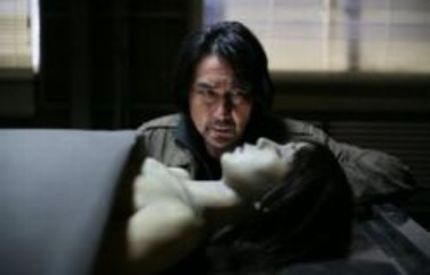RETRIBUTION Review

Retribution opens today in Malaysian cinemas.
Kurosawa Kiyoshi's films are getting a little too weird for me these days. After the very unfortunate misstep that was Loft, the director made this commissioned work, Retribution, which takes him back to what he's best at - a combination of the crime thriller and the ghost story that brings together the familiar elements from his previous films, Cure and Pulse.
Funnily enough, Kurosawa revealed in a recent interview that Loft was a more personal film, one that he had wanted to make. But between these two recent output from him, Retribution is the one that comes off more convincing and solid. But it sure isn't an easy film to sit through.
While Tokyo is beseiged by a series of small earthquakes, a bizarre series of murders also takes place in the city. Detective Yoshioka (Yakusho Koji) soon finds that all the clues from the scene of the first crime point to him as the main suspect. And when he starts to see a ghost in a red dress, he begins to believe that he might just be the murderer.
But as time goes on, it seems that there's more to the case than Yoshioka can imagine.
Clearly, Kurosawa is once again reaching for a larger context here, as he delves into the same apocalyptic nightmares of Cure and Pulse (one disaffected youth in the film could have walked right out of Bright Future). If you're familiar with those two films, then you'd be spotting a lot of familiar things from both. The ambiguity this time, is heavier and murkier, and Kurosawa leaves us with enough clues to piece everything into at least a seemingly coherent whole, but not enough to be truly satisfying.
But his idea of abandonment, being left behind by time, people and progress, is no less interesting. He was clearly inspired by the disparity between the old and the new in Tokyo, and the sense that amidst all that modernistic sheen, on the fringes of the city there exists something quite forgotten. In the rush of modernity, people don't take time enough to stop and really take a look, as one character says something to that effect.
As the earthquakes go on, so the seawater moves inland, as if to reclaim what's lost. Is this the "retribution" of the title?
Kurosawa's films are always like little puzzles that challenge us, prod us, provoke us, but they are also ingeniously crafted in a way that they are open-ended enough to be interpreted in many ways. The director simply refuses to adhere to the rules or supply us with the usual fitting pieces. This is evident in the way he cuts his films. Just as something has started to happen, he suddenly cuts to another scene, an effect that is jarring as it is a shock to a system that's been conditioned to respond in a certain way. Everything is designed to create a disturbing effect, from the soundtrack to the cinematography and the painstaking framing.
Kurosawa's refusal of conventions also extends to his portrayal of the ghosts in his films. There are no quick cuts, no hiding, no teasing. His ghosts simply stare into the camera for the longest time, not afraid to be seen, as much as the director is not afraid to lose the shock effect in such unusually long takes of this kind of scenes. This, in fact, threatens to make things a little too theatrical sometimes, but Kurosawa's intentions are not to provide cheap shocks and easy scares. His ghosts have something to say about how their inward struggles inform the outward conflicts that threaten to tip the world over into an apocalypse. This ambivalence extends to the protagonists as well.
But just as we think there is no easy satisfaction anywhere in Retribution, Kurosawa hits us square in the face with a sudden and shocking scene towards the end, where the expected becomes the unexpected.







